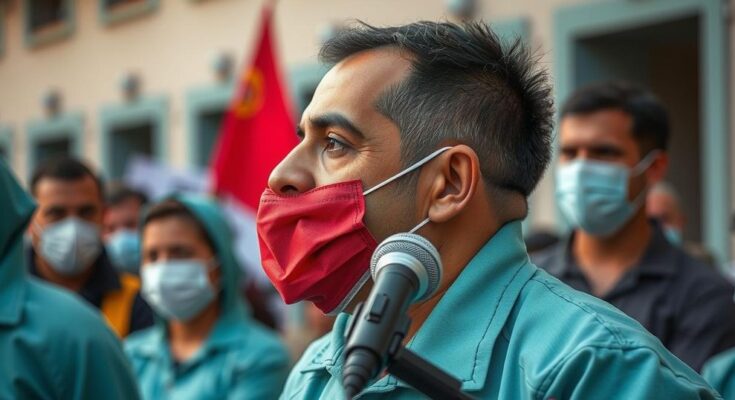Said Ait Mahdi, a Moroccan activist, was sentenced to three months in prison for leading protests against the government’s response to a devastating earthquake that affected the Al Haouz region. His sentencing has been condemned by human rights advocates as politically motivated, reflecting broader issues of repression against dissent in Morocco. Protests continue to call for accountability and a more effective recovery from the disaster.
A prominent Moroccan activist, Said Ait Mahdi, has received a three-month prison sentence following his protests against the government’s response to the devastating earthquake that struck the Al Haouz region in September 2023. Human rights groups have condemned the sentence as arbitrary and politically motivated, highlighting the ongoing repression of dissent in the country. Along with the prison term, Ait Mahdi has been fined over $1,000, facing charges such as defamation and inciting unauthorized demonstrations. Protests erupted across the earthquake’s impact zones, where officials were accused of mishandling recovery efforts as many residents remain without adequate shelter.
Ait Mahdi is the first activist from the affected area to be sentenced, reflecting a broader trend of government pushback against activism. Defense attorney Isaac Charia noted that while Ait Mahdi faced potential for a longer sentence, the outcome was less severe than expected. Notably, three fellow activists charged similarly were acquitted, marking a turning point in the ongoing courtroom battles for regional advocates.
The Moroccan Association for Human Rights characterized Ait Mahdi’s arrest as retaliation for his advocacy on behalf of earthquake victims, labeling it a violation of civil liberties. A coalition of NGOs has publicly criticized the government’s handling of disaster recovery, stating that charges against Ait Mahdi represent an attempt to obscure serious failings in response efforts. The earthquake caused extensive damage, disproportionately affecting indigenous minority communities, prompting demands for accountability and equitable recovery measures from authorities.
Activists have organized demonstrations in various cities, including Rabat, to highlight concerns about the slow pace of reconstruction efforts, with government estimates indicating significant infrastructural damage. Ait Mahdi has been described as a vital voice for the marginalized individuals impacted by the earthquake, illustrating the critical intersection of activism and disaster response in Morocco.
In September 2023, a devastating 6.8-magnitude earthquake struck the Al Haouz region in Morocco, resulting in nearly 3,000 fatalities and widespread destruction. The aftermath of the earthquake ignited public protests against the government’s perceived failure to adequately manage the recovery efforts. Activists and advocacy groups have rallied to address the needs of the displaced and have criticized the government’s development policies, which they argue exacerbate existing regional inequalities in a country marked by significant disparities between urban and rural areas. Amidst these tensions, the sentencing of Said Ait Mahdi serves as a focal point in the ongoing struggle for human rights and accountability in Morocco. Advocacy groups have voiced concerns that the government is using judicial measures to suppress voices demanding reform and recovery, framing Ait Mahdi’s case as part of a broader pattern of repression against dissenting opinions in the country. The backdrop of this legal battle is not only a quest for justice for earthquake victims but also a confrontation with systemic issues related to governance and civil liberties in Morocco.
The sentencing of Said Ait Mahdi illustrates the ongoing tensions between activists advocating for disaster recovery and the Moroccan government’s response to public dissent. Ait Mahdi’s case has drawn international attention and condemnation, underscoring concerns over political repression and human rights violations in Morocco. As citizens continue to face hardships in the wake of the earthquake, the struggle for justice and accountability remains a critical issue. The situation highlights the urgent need for a more transparent and just recovery process that addresses the needs of all affected individuals.
Original Source: abcnews.go.com




